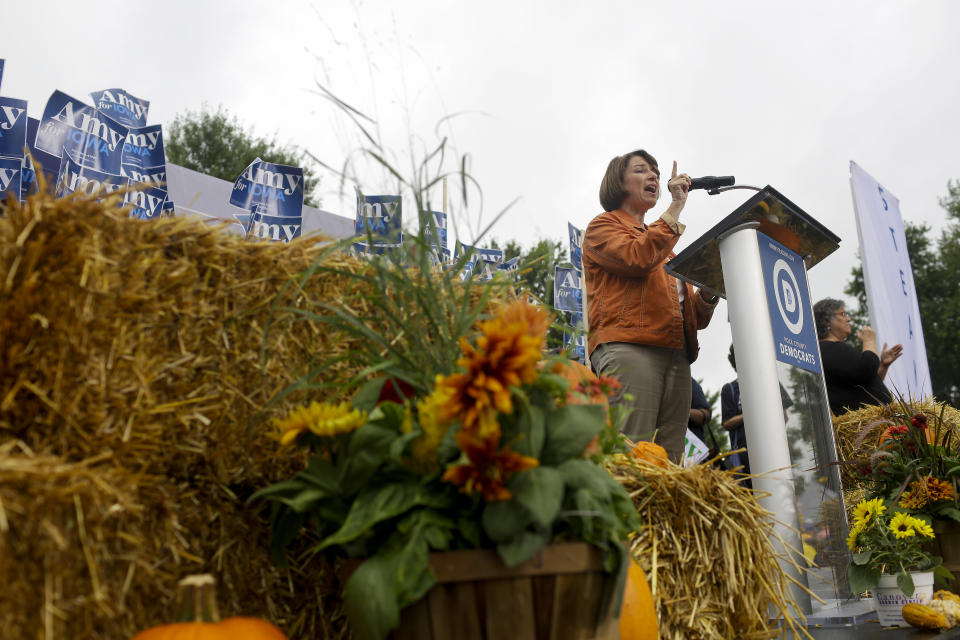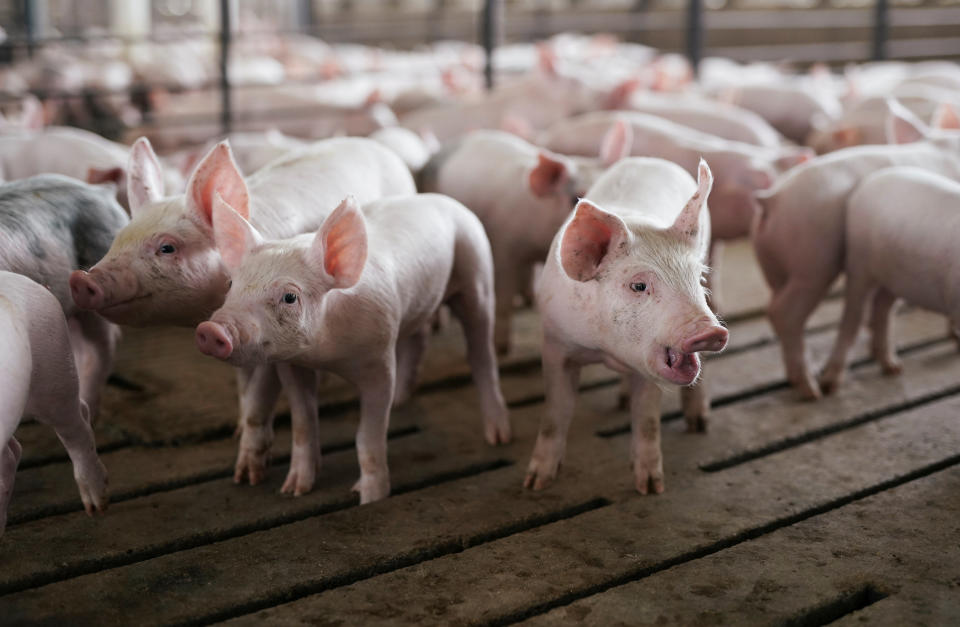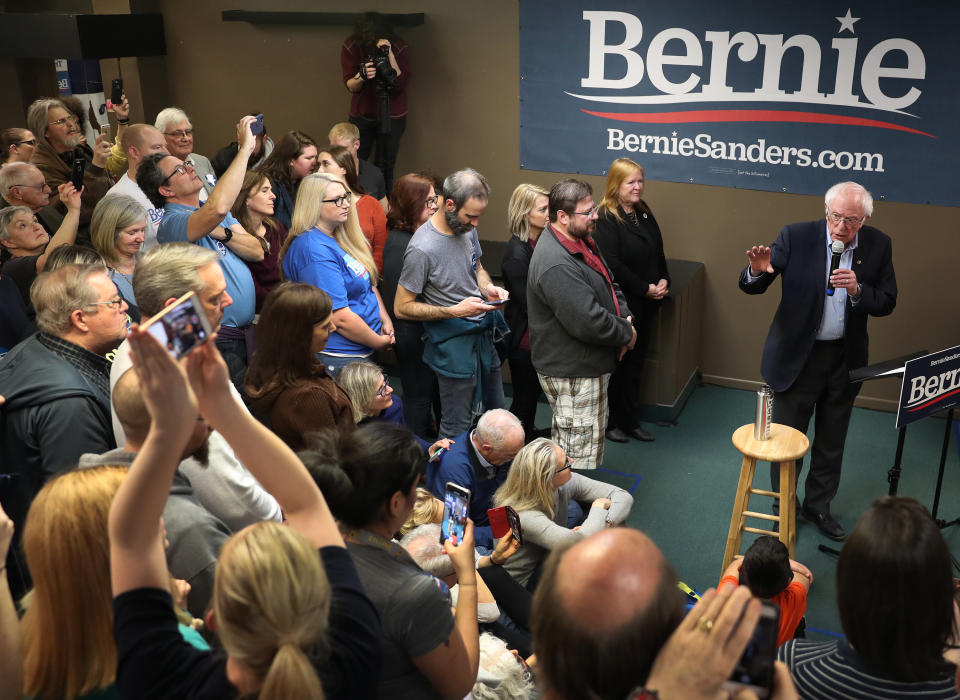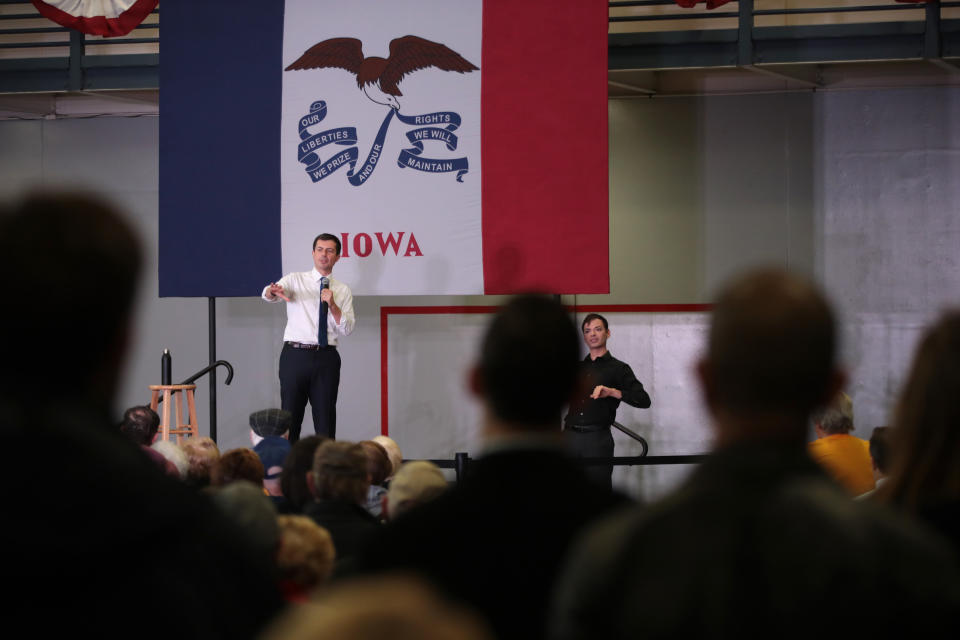Iowa’s Democrat-voting farmers ahead of Monday’s caucuses: ‘We are cannon fodder’
Farmers and other rural voters could be the key on caucuses night. Nearly a quarter of Iowans are either active farmers or have been at some point in their lives.
And Iowa’s community of Democrat-voting farmers is preparing for Monday’s caucuses with a lot on their minds.
Boyd Campbell farms about 2,000 acres in Northern Iowa and also serves on the board of directors of a local agricultural bank in the town of Rudd. “I see an awful lot of balance sheets and income statements. We are losing, we're losing out,” he says, adding that his fellow farmers are “burning through equity.”
A recent survey by the University of Iowa found that when farmers were asked what was causing them stress, financial concerns dominated and newly-released court data found that bankruptcies among family farmers are at an eight-year high.
The hard times have helped push Campbell—a lifelong Republican—away from the party. The last election in 2016 was the first time he’d ever cast his presidential vote for a Democrat. “I voted for Clinton,” he said in an interview with Yahoo Finance. “When I did that, let me tell you, that was like pulling me through a knot hole backwards, boy.” Campbell is planning to attend his first ever Democratic caucus on Monday night and support Sen. Amy Klobuchar.

Most rural Democrats place their troubles squarely at President Trump’s feet. The twist is that few of their neighbors agree. A recent Farm Journal’s Pulse Poll found a sky-high 83% approval rating for Trump. As for why Trump commands such support, Campbell could just say: “There are some mysteries in life that are hard to explain, aren't they?”
Over 170,000 Iowans of all types participated in the 2016 caucuses and many expect turnout to be even higher this time around. The results on Feb. 3 among Iowa’s farmers and rural voters will likely be a make-or-break moment for multiple Democratic campaigns. As Pete Buttigieg, also banking on rural communities to fulfill his promise that he can flip Trump counties, noted on Sunday, “we need to do very well in Iowa.”
A range of issues from trade to hog farming
Sixth-generation farmer Pam Johnson lives just down the road from Campbell. She grows corn and soybeans on 2,700 acres and is a former president of the National Corn Growers Association. Like Campbell, she plans to caucus for Klobuchar. Johnson’s No. 1 issue: Trump’s actions on renewable fuels, ethanol in particular.
Farm groups have expressed anger with the Trump administration’s decision to grant waivers on environmental rules that have had the impact of reducing the amount of ethanol in the nation’s gasoline supply. The Trump administration has responded by considering changes to the exemptions in the biofuels deal somewhat to help increase ethanol demand. They reportedly may announce changes as early as next week.
“That’s turned out to be a really big cut in demand for ethanol over the last year,” says Johnson. “That's one big huge broken promise, which equals hardship and destruction of demand for corn and soybeans,” she adds.
Another key issue: the trade tensions and uncertainty that have marked the first three years of the Trump administration. The recent signings of the USMCA trade pact and phase 1 of the China trade deal have led many farmers to celebrate, but Democratic-leaners remain wary. “At first blush it looks like the answer to your prayers until you drill down into the details,” says Johnson.
“I just can't emphasize that enough, how hurt, how bad it's been,” says Campbell of the trade wars. He also resents the lumping in of agriculture alongside things like forced technology transfer and intellectual property theft. “My argument is, we are cannon fodder,” Campbell says of farmers. “I don't think Intel, IBM, or all them are going to send us a check and say, ‘Thank you for what you've done for us over in China.’”
A rural twist on the health care issue
Dr. Glenn Hurst lives in the tiny western Iowa town of Minden (population 599, according to the 2010 Census). He’s a physician and serves as vice chair of the “rural caucus” within the Iowa Democratic Party.
He echoes that ethanol and trade are key issues among the overall caucus but it’s health care—and the unique challenges of rural health care—that loom largest for Hurst. "Our problem is truly access to care," he says, adding that "what we have in a rural community is a small population already, and then that population is cut even smaller for the provider, because they're not in network with a particular product."
Hurst notes that he recently lost a family of patients when their employer switched their insurance product. “Medicare for all, what I really mean by that is a single payer system, would provide every citizen of my community access to me as a provider” he says.
Hurst also brought up issues rarely discussed outside of rural communities. Confined animal facilities, and the pollution and smell that accompany them, is one that comes up on the Iowa campaign trail.

Preparing to caucus amid overwhelming Trump support
While Trump has maintained a sky-high approval rating among farmers, he has returned the favor by lavishing attention on them. In fact, he brought up farmers well over 100 times in 2019 while discussing the ongoing China trade talks, according to an analysis by Yahoo Finance.
“The farmers are happy,” he said in December during remarks in the Oval Office. “They had to put up with a lot, but we took care of them.”
Trump was even more blatant at a recent rally in Iowa. “If we don’t win, your farms are going to hell, I can tell you right now,” he told his Iowa supporters “Sell, sell, they’ll be saying sell.”
Johnson, the corn and soybean farmer, knows the uphill battle she faces in convincing her neighbors to step away from Trump. Each week, she appears on the “Free for All Friday” segment of a national radio program called Agritalk that debates a range of agricultural issues. When the talk turns to politics: “I'm like the outlier on there,” she says.
Johnson is passionate about the troubles farmers have endured in recent years. As she talks up Klobuchar, her chosen candidate, Johnson focuses her efforts on what she calls the “movable middle.” There is a group of her fellow farmers, she believes, who are open to listening and are beginning to realize that “maybe [Trump] doesn't always do right, and maybe he doesn't fulfill his promises, and maybe he's told a few lies.”
A range of Democratic options
Klobuchar, the Minnesota senator, may have the most riding on the results when Iowa’s farmers gather Monday night. She has focused her campaign on the state’s rural community and visited all 99 of Iowa’s counties. She released a detailed rural plan that touches on everything from renewable fuel standards to rural health care.
Klobuchar and her allies note again and again that she’s won in rural areas where Donald Trump defeated Hillary Clinton in 2016. Floyd County, Iowa—where both Campbell and Johnson live and farm— was won handily in 2016 by Trump and, it’s worth noting, is just a 45-minute drive away from the Minnesota border.
“She's right in the state next to us and so I'm very familiar with her,” says Campbell. “She was the first candidate to call President Trump out on those small refinery waivers last summer,” adds Pam Johnson.

Even after all her work, Klobuchar remains in fifth place across Iowa and her campaign manager, in a memo to reporters, predicted that “achieving viability in rural and mid-sized precincts will propel us forward in the delegate count.”
Bernie Sanders appears to be the front-runner statewide and is also making a serious play for rural voters. As a Vermont senator, he was deeply involved in rural issues. He has released his own detailed rural plan and the campaign produced an extended video focused on his work for Vermont’s farmers as a member of the U.S. House.
Candidates Pete Buttigieg and Elizabeth Warren have also released rural plans and traveled extensively to speak with farmers and other rural voters. Both campaigns emphasize organization as what will help them over-perform on Monday night.
Warren’s campaign claims she has “built the widest and deepest pool of Iowa political support in the 2020 presidential field” and released a long list of endorsers, including a number of farmers.
Mayor Pete, who has his own midwestern roots, has spent considerable time in counties that flipped from Barack Obama to Donald Trump in 2016. He also likes to discuss how he spent a few weeks working in the rural community of Creston, Iowa, during the 2008 campaign.

The question of electability
It remains to be seen whether farmers will begin to move away from Trump if the economic hardships worsen.
"What we have to do is demonstrate that we are listening to people from the rural communities," says Hurst, who helps organize regular calls and meetings among the Democrats. He says Trump has been successful after he "echoed the sentiments of the people."
Campbell, even after his Democratic vote in 2016, still considers himself a moderate Republican. His vote in November remains up for grabs. He says he’ll never support a candidate like Bernie Sanders. Asked about a general election match-up between Trump and Sanders, he said he’d do a write-in or only vote in other races.
“I just think [Klobuchar is] the most electable, and I guess that's getting down to it,” he says. Asked about his second choice, Campbell took a five-second pause before finally saying, “Golly, I guess I would have to go with Biden.”
Ben Werschkul is a producer for Yahoo Finance in Washington, DC.
Read more:
What are the Iowa caucuses? Your FAQs and the process explained
U.S. farm bankruptcies hit an 8-year high in 2019
How Bernie Sanders – and Trump – are making Social Security a big issue for 2020
Read the latest financial and business news from Yahoo Finance
Follow Yahoo Finance on Twitter, Facebook, Instagram, Flipboard, LinkedIn, YouTube, and reddit.
